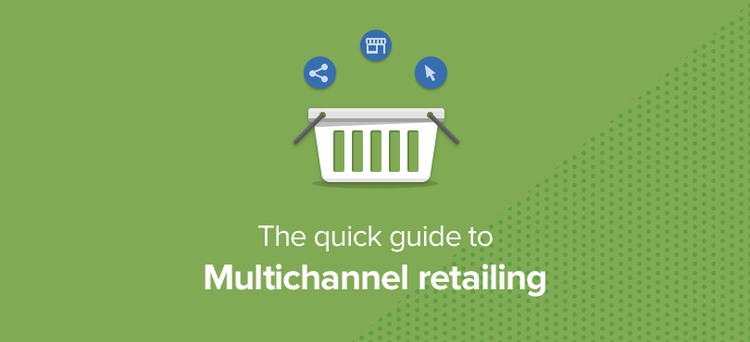The quick guide to multichannel retailing

Selling across multiple channels and dispatching with a range of couriers is essential to running a competitive retail business, attracting shoppers, and ensuring you’re increasing revenue while keeping your costs low. We take a look at how to run a successful multichannel retail business and why.
What is multichannel retailing?
Multichannel retailing is when a business has more than one sales channel, this can include anything from a brick and mortar shop to a range of online channels such as marketplaces or ecommerce sites.
Driven by consumers’ behaviour, and their evolving habits of researching, browsing and purchasing across different platforms, multichannel retailing increases sales and is often the key to growing a successful retail business.
Why should you care about multichannel retailing?
As simple as it sounds, the data backs up the obvious, with the average retailer that sells on two online channels, making double the revenue of retailers that sell on just one. For retailers with their own site, selling on one marketplace as well has shown to increase revenue by 38%. Those selling on two marketplaces as well as their website are the ones that capitalise the most, with the research showing that they stand to make 120% more revenue.
And as for the benefits of selling on your own site as well as on marketplaces, ecommerce sites have 18% fewer orders than marketplaces, but they make 129% more revenue per order.
The benefits of multichannel retailing
Most shoppers start their buyer journey using a search engine or searching well-known marketplaces such as Amazon. A survey of shoppers in the US, UK, Germany and France found that Google (85%) and Amazon (72%) were the top sites used to find product ideas and information before making a purchase. Significantly, 52% of shoppers would look at a product on Amazon before looking at other sites.
Marketplaces don’t have to be considered a competitor; they’re an important, additional, source of revenue. Your products need to appear in search engine results and on marketplaces so that customers can discover them, and, in turn, your business. Your focus shouldn’t just be on your own website - you need to reach out to shoppers at every available point, from social media to blog content, search engines and marketplaces.
Not only is multichannel retailing important for reaching shoppers, but it also allows them a choice of how to make a purchase. Shopper’s ordering for the first time may have more confidence purchasing through a site that they’re familiar with and trust, such as eBay and Amazon.
How to be a successful multichannel retailer
Running a successful multichannel retail business requires a few key things: brand consistency, efficient processes, and the ability to review and adapt your approach.
- Brand consistency - Whichever channels you decide to sell on, they need to be consistent in their image, branding, messages and products. If you’re looking to create a successful brand across multiple channels, then shoppers need to be able to recognise it on each different platform.
- Running the business - For every additional sales channel you’re increasing the admin, marketing and order management that you need to undertake. It’s important to establish a good reputation, and that will be largely dependent on you ability to manage sales, process orders and dispatch them across all your channels.
- Assess and adapt - It’s crucial to consistently monitor, review and adapt your multichannel retail approach. Listing products across a number of sales channels can be complicated and the fees and other costs all add up if you don’t keep an eye on it. You need to assess which channels are working for you, when and where to adapt the business, as well as making sure you learn from successes and failures.
Zenstores helps multichannel retailers
Zenstores’ order management and shipping features are essential to keeping on top of all your orders coming in from multiple sales channels. If you haven’t used Zenstores before, we encourage you to take a look.
Zenstores has been shown to reduce dispatch times for retailers by as much as 20 hours a week, valuable time that you can use to focus on branching on to other sales channel and refining the ones you presently sell on.
Zenstores integrates with eBay, Amazon, Shopify, Etsy, WooCommerce and Magento, as well as shipping providers and couriers: Royal Mail, Parcelforce, DPD, DPD Local, APC Overnight, MyHermes, Yodel and Parcel2Go.

